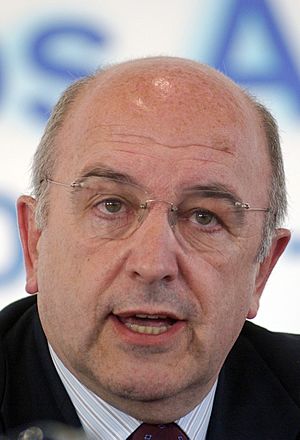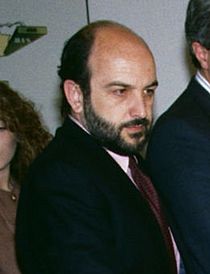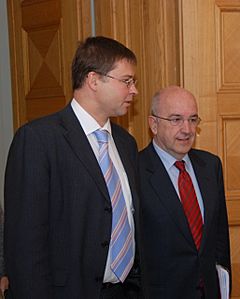Joaquín Almunia facts for kids
Quick facts for kids
Joaquín Almunia
|
|
|---|---|

Almunia in 2007
|
|
| European Commissioner for Competition | |
| In office 9 February 2010 – 1 November 2014 |
|
| President | José Manuel Barroso |
| Preceded by | Neelie Kroes |
| Succeeded by | Margrethe Vestager |
| European Commissioner for Economic and Financial Affairs | |
| In office 24 April 2004 – 9 February 2010 Served with Siim Kallas |
|
| President | Romano Prodi José Manuel Barroso |
| Preceded by | Pedro Solbes |
| Succeeded by | Olli Rehn |
| Leader of the Opposition | |
| In office 14 May 1999 – 1 July 2000 |
|
| Prime Minister | José María Aznar |
| Preceded by | Josep Borrell |
| Succeeded by | José Luis Rodríguez Zapatero |
| In office 22 June 1997 – 24 April 1998 |
|
| Prime Minister | José María Aznar |
| Preceded by | Felipe González |
| Succeeded by | Josep Borrell |
| Minister of Public Administrations | |
| In office 26 July 1986 – 12 March 1991 |
|
| Prime Minister | Felipe González |
| Preceded by | Félix Pons Irazazábal |
| Succeeded by | Juan Manuel Eguiagaray |
| Minister of Labor and Nacional Health Service | |
| In office 2 December 1982 – 26 July 1986 |
|
| Prime Minister | Felipe González |
| Preceded by | Santiago Rodríguez Miranda |
| Succeeded by | Manuel Chaves González |
| Personal details | |
| Born |
Joaquín Almunia Amann
17 June 1948 Bilbao, Spain |
| Political party | Socialist Workers' Party |
| Alma mater | University of Deusto Practical School for Advanced Studies |
Joaquín Almunia Amann, born on June 17, 1948, is a Spanish politician. He was an important member of the European Commission, which is like the government of the European Union.
From 2004 to 2009, he was the European Commissioner for Economic and Financial Affairs. This means he helped manage the money and economy for the European Union. Later, from 2009 to 2014, he became the Vice-President and European Commissioner for Competition. In this role, he made sure businesses competed fairly.
Before working for the European Union, he was a minister in the Spanish government. He served as the Minister for Employment from 1982 to 1986 and Minister for Public Administrations from 1986 to 1991. He also led the main opposition party in Spain, the Spanish Socialist Workers' Party, from 1997 to 2000.
Contents
Early Life and Education
Joaquín Almunia was born in Bilbao, Spain, on June 17, 1948. His father was an engineer, and his mother came from a family with German roots. His grandfather, Isaac Amann, helped build the Bilbao–Getxo railway.
Almunia went to the Jesuit School of Indautxu in Bilbao. He studied economics and law at the University of Deusto, finishing his degrees in 1971 and 1972. He also continued his studies in Paris from 1970 to 1971. In 1991, he attended a special program for government leaders at Harvard University in the United States.
From 1991 to 1994, he taught about employment and social security law at the University of Alcalá de Henares.
Political Career
Early Roles and Government Work
From 1976 to 1979, Almunia worked as the chief economist for the Unión General de Trabajadores (UGT). This is a large trade union in Spain that is connected to the Spanish Socialist Workers' Party (PSOE). Before that, from 1972 to 1975, he was an economist for the Spanish Chambers of Commerce in Brussels.
Almunia was a member of the Spanish Parliament, called the Congress of Deputies, from 1979 to 2004. He represented the region of Madrid.
He held important positions in the Spanish government:
- Minister of Employment and Social Security from 1982 to 1986.
- Minister of Public Administration from 1986 to 1991.
He also served as the spokesperson for the PSOE party from 1994 to 1997.
Leading the Socialist Party
After Felipe González stepped down as party leader in 1996, Joaquín Almunia became the new leader of the PSOE party. He held this position from 1997 to 2000.
In 1998, another party member, Josep Borrell, decided to run against Almunia to become the party's candidate for Prime Minister. This was the first time the PSOE held a primary election where members voted directly. Borrell won this election, even though many party leaders supported Almunia.
However, in May 1999, Borrell resigned as the prime ministerial candidate due to an investigation involving former officials he had appointed. Because of this, Almunia became the PSOE candidate for prime minister in the 2000 Spanish general election.
The PSOE party lost the election to José María Aznar and his conservative PP. This was a difficult election for the PSOE, and Almunia resigned as party leader afterward.
After leaving his leadership role, Almunia directed a research program on income equality from 1991 to 1994. In 2002, he started and led a progressive research group called Laboratorio de Alternativas.
European Commissioner Role
Joaquín Almunia joined the Prodi Commission (a group of European Commissioners) on April 26, 2004. He took over from Pedro Solbes. He was reappointed by José Manuel Barroso in November 2004.
As the EU Commissioner for Competition, Almunia was in charge of making sure companies followed fair rules. He investigated big companies like Google, Apple, Starbucks, Fiat, and Amazon to ensure they were not getting unfair advantages or avoiding taxes. These investigations were completed by his successor, Margrethe Vestager, and the European Court of Justice confirmed the Commission's decisions in 2024.
He is also an Honorary Fellow of St Edmund's College, Cambridge.
Other Activities
International Organizations
- European Bank for Reconstruction and Development (EBRD): He was a member of the Board of Governors from 2004 to 2010.
Non-profit Organizations
- Aristide Merloni Foundation: Member of the Scientific Council since 2019.
- The European House – Ambrosetti: Member of a committee focused on European energy in 2015.
- Centre for European Policy Studies (CEPS): Chairman.
- Centre for European Reform: Member of the Advisory Board.
- European Council on Foreign Relations (ECFR): Member.
- European Policy Centre (EPC): Member of the Strategic Council.
- Friends of Europe: Member of the Board of Trustees.
- Jacques Delors Institute: Member of the Board of Directors.
See also
 In Spanish: Joaquín Almunia para niños
In Spanish: Joaquín Almunia para niños
 | Lonnie Johnson |
 | Granville Woods |
 | Lewis Howard Latimer |
 | James West |



